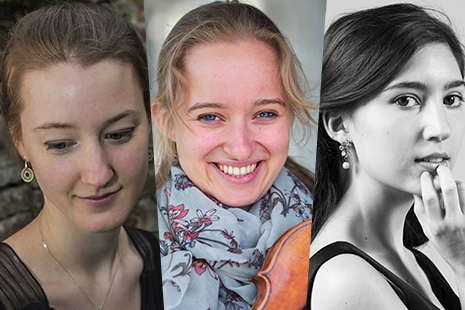Maria Portela Larisch (sopraan/soprano)
Veronique De Raedemaeker (viool/violin)
Mathilde Wauters (harp)
— English version —
Het Trio Gilu bestaat uit sopraan, viool en harp, en werd gevormd tijdens de Corona Pandemie door de drie jonge vrouwen Maria Portela Larisch, Veronique De Raedemaeker en Mathilde Wauters. Het wegvallen van een duidelijk toekomstperspectief zette hen aan om het project ‘Saudades of the future’ uit te denken. Saudades is een niet letterlijk te vertalen Portugees woord voor gemis, verlangen. Geïnspireerd door drie vrouwelijke poëten uit de vorige eeuwen (Karoline von Günderrode, Emily Dickinson en Selma Meerbaum Eisinger) die ook op sterke wijze “Saudades” ondervonden, ging het Trio Gilu de samenwerking aan met jonge componisten van nu (Ruben De Gheselle, Helena Cánovas Parés, Matthias Krüger en Martin Letelier) waarin de poëzie van deze vrouwen herontdekt wordt en in de vorm van nieuwe muzikale composities troost en hoop biedt aan het publiek. Gilu verwijst naar het gelijknamige gedicht van Selma Meerbaum-Eisinger. Hierin beschrijft ze de dans Gilu, die een symbool is van vrijheid in alle gebieden. Het woord betekent ook: jubelen, zich verheugen.
Trio Gilu consists of soprano, violin and harp, and was formed during the Corona Pandemic by the three young women Maria Portela Larisch, Veronique De Raedemaeker and Mathilde Wauters. The loss of a clear future perspective prompted them to devise the ‘Saudades of the future’ project. Saudades is a Portuguese word that cannot be literally translated for lack, desire. Inspired by three female poets from the previous centuries (Karoline von Günderrode, Emily Dickinson and Selma Meerbaum Eisinger) who also strongly experienced “Saudades”, the Gilu Trio collaborated with young composers of today (Ruben De Gheselle, Helena Cánovas Parés, Matthias Krüger and Martin Letelier) in which the poetry of these women is rediscovered and offers comfort and hope to the public in the form of new musical compositions. Gilu refers to the poem of the same name by Selma Meerbaum-Eisinger. In it she describes the dance Gilu, which is a symbol of freedom in all areas. The word also means to rejoice, to rejoice.
